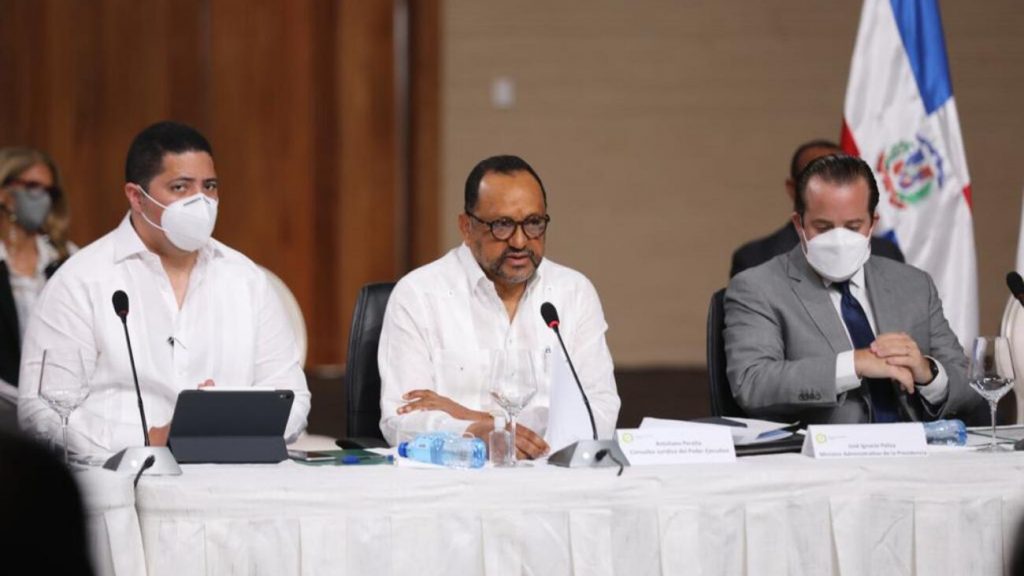
During the three-hour meeting, President Luis Abinader defended the talks to discuss important reforms on grounds that these are necessary to modernize the country. Among the proposals presented is one for excluding the Attorney General as a member of the National Council of the Magistracy (CNM). The Attorney General is appointed by the President and gives the President a deciding vote in the CNM, the government body that chooses the judges of the higher courts.
The President also proposed the reorganization of the higher courts — Supreme Court of Justice (SCJ), Superior Electoral Court (TSE), and the Superior Administrative Court (TSA) — so that their judges be bound to more rigorous selection, permanence and alternating criteria. He proposes the judges be appointed for nine years. Among the criteria is that the judges chosen have not campaigned for any politician in the past five years. The incumbent president of the Supreme Court of Justice, Luis Henry Molina, was a high profile campaigner for the presidency for former President Danilo Medina in 2016 and campaigned for Gonzalo Castillo in 2020.
The President proposed strengthening the independence of the Public Prosecutor’s Office through a constitutional transformation that grants it total independence from the Executive Power and the other powers of the state, while instating new limits to roles and specializing it for the investigation and prosecution of crime.
He proposed the consolidation of democracy and called for improvements to the electoral system, mainly related to the organization of the electoral assemblies and the strengthening of the Superior Electoral Court (TSE) and the Central Electoral Board (JCE).
The President also proposed the consolidation of the bodies in charge of the external and internal control of public funds, these are the Chamber of Accounts and the Comptroller General of the Republic office.
The President submitted introductions to the proposed reforms.
There is much speculation that the talks could end up being a waste of time. The dialogue has been criticized because among the issues to be discussed are matters that are already bills under study in Congress. In the case of other reforms, the special committees have been created already by the Presidency, such as in the case of Police reform. Business and labor sectors understand the social security and labor issues should be tackled in other scenarios.
Meanwhile, Guillermo Moreno, president of the Alianza Pais minority political party, criticized the scheme used by the government for the National Talks. During the first session on 30 August, Moreno had requested that the Presidency present concrete proposals to be studied by the participants and determine the order of priorities. He criticized that when the Social and Economic Council (CES) met again for the talks on 15 September the proposals were not presented nor the order of priorities.
When interviewed on 15 September on the talks, Moreno remarked: “I am more confused today than the first time. I do not know where we are going. I imagine 15 tables with people discussing issues, reaching an agreement without knowing where we are going.”
He asked that concrete proposals be submitted for each of the proposed reforms so that discussions can focus on the specifics and so that the dialogue does not end up being unproductive. “We want the Executive Branch to bring a bill to amend the Constitution where it says article such and such says so and it will say so and so, because that sets the base for the discussions,” he said. “We cannot start running without knowing where we are going,” he remarked. He said if there is not a framework, the dialogue will be unproductive and end up just being discussions fit for publishing in a book.”
It was decided that the methodology to be used will be proposed in the 6 October 2021 next meeting.
On the Social and Economic Council discussions table are constitutional reform, taxation, quality in education, social security, national police, electric and water sectors, transport, hydrocarbons and digital transformation, among others. Moreover, the government proposes to exclude police reform from the debates because a committee had already been designated to study this issue.
Read more in Spanish:
Presidency
N Digital
N Digital
N Digital
Noticias SIN
Acento
El Dia
Diario Libre
16 September 2021

